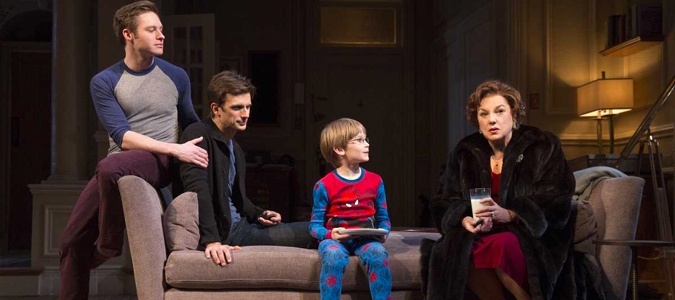

Mothers and Sons
Opening Night: March 24, 2014
Closing: June 22, 2014
Theater: John Golden Theatre
Twenty years after her son’s death, a mother turns up at the door of his former lover, who is now married to another man and has a young son. This man and his family challenge the woman to confront the truths of their shared past, and a future she never imagined. Values clash as they struggle to reconcile their vastly different worlds.
BUY TICKETSREAD THE REVIEWS:
March 24, 2014
Terrence McNally’s new play opens with a woman of a certain age wearing a lush, black fur coat. It’s a provocatively politically incorrect garment — and a giveaway that what will come out of her mouth will be, too. Of gay couples, she says: "After all these years, it still sickens me." Of her son being born gay: "Everything is a choice." On the concept of gays able to marry: "How easily you say that word, husband." At least she vaguely knows how offensive she is. Exasperated, she confesses: "Everything I say is inappropriate." The woman in Mothers and Sons is Katharine Gerard, and she has come unannounced on a cold winter’s day to the Central Park West apartment of her son’s former lover. He died of AIDS almost 20 years ago, and she has a lot of unresolved feelings — about him, her and the world in general.
READ THE REVIEWMarch 24, 2014
When we get our first glimpse of Tyne Daly in Terrence McNally’s new drama Mothers & Sons, she’s wrapped in a luxurious fur coat. It’s a nice garment, even if it was bought at a second-hand shop, but it isn’t going to protect her from the chill inside an apartment high above Central Park. As the curtain rises on the playwright’s 20th Broadway show, Daly, as widowed Texan Katharine Gerard, is standing shoulder-to-shoulder with Cal Porter (Frederick Weller). This is the first time Katharine and Cal have seen each other since the memorial service for Andre—her son, and Cal’s one-time partner—who died from AIDS complications 20 years earlier.
READ THE REVIEWMarch 24, 2014
One of the questions at the center of Terrence McNally’s insightful and moving drama Mothers and Sons is, Why is it so difficult for a mother to love her son for who he is, and vice versa? McNally initially frames the problem in terms of a homophobic mother’s inability to accept her son’s homosexuality, even after he’s been dead for many years; were the play simply about this it would have been more than satisfying. But McNally’s work is outstanding. It transcends the issue of gay-acceptance and puts its question more broadly: Can anyone love us for us?
READ THE REVIEWMarch 24, 2014
The growing normalcy of gay life in America poses a problem for playwrights like Terrence McNally, whose work has often centered on marginalization. Perhaps that’s one reason that McNally’s output has been so unsteady in recent years; the righteous drive that impelled him during the AIDS crisis had shifted into neutral. The sincere drama Mothers and Sons marks a return to familiar territory—the play is a follow-up to McNally’s 1988 playlet (and 1990 telecast) Andre’s Mother, in which a woman hovers at her gay son’s memorial service—and also a return to form. Though dated at times, and shaded with passive aggression, this is arguably McNally’s best play in 20 years.
READ THE REVIEWMarch 24, 2014
After her debut in 1990 on PBS’s American Playhouse, the gorgon mother known as Katharine Gerard is not a character most people would care to revisit, least of all in a full-length Broadway play. But there she is on stage at the Golden Theatre, where Terrence McNally’s Mothers and Sons opened Monday, now inhabited by Tyne Daly and acting every bit the human refrigerator that the late Sada Thompson presented in that 1990 episode titled Andre’s Mother. Did McNally bring Katharine back just to beat her up again? Maybe. Whatever, this public trashing is a riveting show. Of course, by play’s end Katharine has delivered a couple of bombshells that explain her bitterness, if they don’t exactly absolve her, and Daly gets some of the evening’s biggest laughs without even saying a word.
READ THE REVIEWMarch 24, 2014
The curtain rises on two people frozen in what feels like a thaw-proof silence. Their eyes are fixed straight ahead, and the possibility of even their gazes’ intersecting seems remote; forget about a meeting of minds. With these figures implacably embodied by Tyne Daly and Frederick Weller in Terrence McNally’s Mothers and Sons, any dialogue that might occur seems destined to be nasty, brutish and short. Yet a conversation is going to happen, as surely as Gary Cooper faced down his enemies in High Noon. It has to. These people have so very, very much to say. More to the point, so does Mr. McNally, a probing and enduring dramatist who has set out to take the pulse of a gay American subculture several decades after the plague that altered its form and content forever.
READ THE REVIEW





















